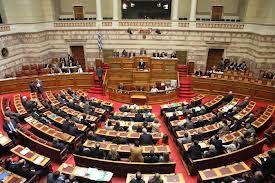by Xenophon Contiades
Before the constitutional revision process begins in Greece it is crucial to focus on the influence exerted by the crisis on the dialogue about constitutional revision. Could it be, that to amend a Constitution in the midst of a crisis is not a wise choice?
To begin with, the evolving narrative about the failure of the Greek constitutional framework is a dangerous myth. Governments by-passing the Parliament in the lawmaking process, the deteriorating protection of civil and social rights, the hesitation of the judiciary to issue rulings of unconstitutionality, the power gain of political parties belonging to the extremes of the political spectrum, the turn towards coalition or technocrat governments that implement policies dictated by the international lenders, are symptoms detected in many European crisis-struck countries and are not a greek exclusivity. Constitutional guarantees and democratic institutions were profoundly impacted in all the affected countries – not just in Greece-, while the severity of the financial and social dimensions of the crisis is directly related to the severity of the consequences for the quality of democracy and the rule of law.
All the above do not suggest that the crisis alone is to be blamed for the malfunctions of the state apparatus and for the lacking fundamental rights protection in Greece. What they do signify, however, is that mismanagement of the crisis may erode democracy – and that this is not a case of Greek exceptionalism. That point must be taken into account in addressing the question whether the blame for the crisis is to be put on the Constitution.
Nonetheless, after the crisis a demand for constitutional reforms emerged in Greece. The post-crisis constitutional dialogue included even talk about the exercise of constituent power- that is, the conversation took a rather precarious turn.
The Greek constitution provides in a satisfactory manner the framework within which parliamentary democracy operates, while it includes one of the most detailed catalogues of civil and social rights to be found in European Constitutions. Certain modifications are undoubtedly necessary, but cannot be considered as crucial for the future of the country. In case the party system has led the country to default, and as a result defaults itself, how can this be attributed to the constitutional framework?
Is it possible that the discussion about the utmost importance of constitutional reform is misleading? First of all, it could sidetrack the attention from malfunctions of the state and the political system, conveying the impression that revising the Constitution could out of the sudden resolve longstanding problems.
On the other hand, the idea of convening a Constituent Assembly implies that all major issues of the constitutional framework, including the form of government must be revisited. This has the potential of causing great insecurity abroad, putting at risk long-standing constitutional guarantees, while it could postpone important legislative reforms.
The question here is whether state restructuring, which is quite necessary, pre-supposes the exercise of constituent power, or even a constitutional revision. The answer is negative. All it takes is a government having the political will to effect changes that may be done by way of ordinary law-making.
The current Constitution is not the source of our misfortunes nor an all purpose remedy. At a time when the society suffers from the crisis extreme cautiousness is required in handling the enormous symbolic force, which the exercise of amending power carries.
Dangers lurk in cultivating the idea that a radical reform of the text of the Constitution can offer a way out of the crisis. Major changes in the way the constitution organizes the polity, such as adopting a presidential system or the enhancement of direct democracy, can either cause novel and serious malfunctions to the political system or adversely remain on paper. That sort of populist maximalism may result to unfortunate experimentations.
The most crucial changes that need to be made can be made without following the long and winding road of constitutional revision. The same political actors who stress the need to change the constitution could instead easily adopt legislation –if they have the political will to do so– to change the electoral law, to impose transparency on the financing of political parties, to establish intra-party democracy, to establish the incompatibility between being a member of Parliament and a member of Cabinet, and to safeguard the failing social welfare mechanisms. No procedural hurdles are in their way. Yet, instead of just doing it they opt to engage in constitutional reform narratives placing, the constitution in the service of micro-politics.
This leads to the question why the same actors who have been unable for years to reduce bureaucracy’s costs, who have uprooted collective bargaining, who have built and maintained clientelism and who have been repeatedly violating or circumventing the Constitution are well-suited to reform it. And in case they do, how much shall change in reality?
Let us thus think of another way out: the political class must come to terms with the fact that the Constitution is not to be remembered at will. Then, the political class must proceed immediately with those changes that can be effected through the legislative path. Such changes could restore the loss faith in the political class. Only after those steps are taken, the dialogue on changing the Constitution may start, with the active participation of the Greek civil society.
To conclude: political credibility once lost, cannot be restored through constitutional reform narratives. Indeed, there are constitutional provisions that require modification, such as those regulating the criminal liability of Members of Cabinet (in an overprotective for them manner), inquiry committees, or the procedure for the selection of the heads of the supreme courts. Still, such constitutional updating has less to offer in the change of scenery, than the enactment of the abovementioned five pieces of ordinary legislation.
